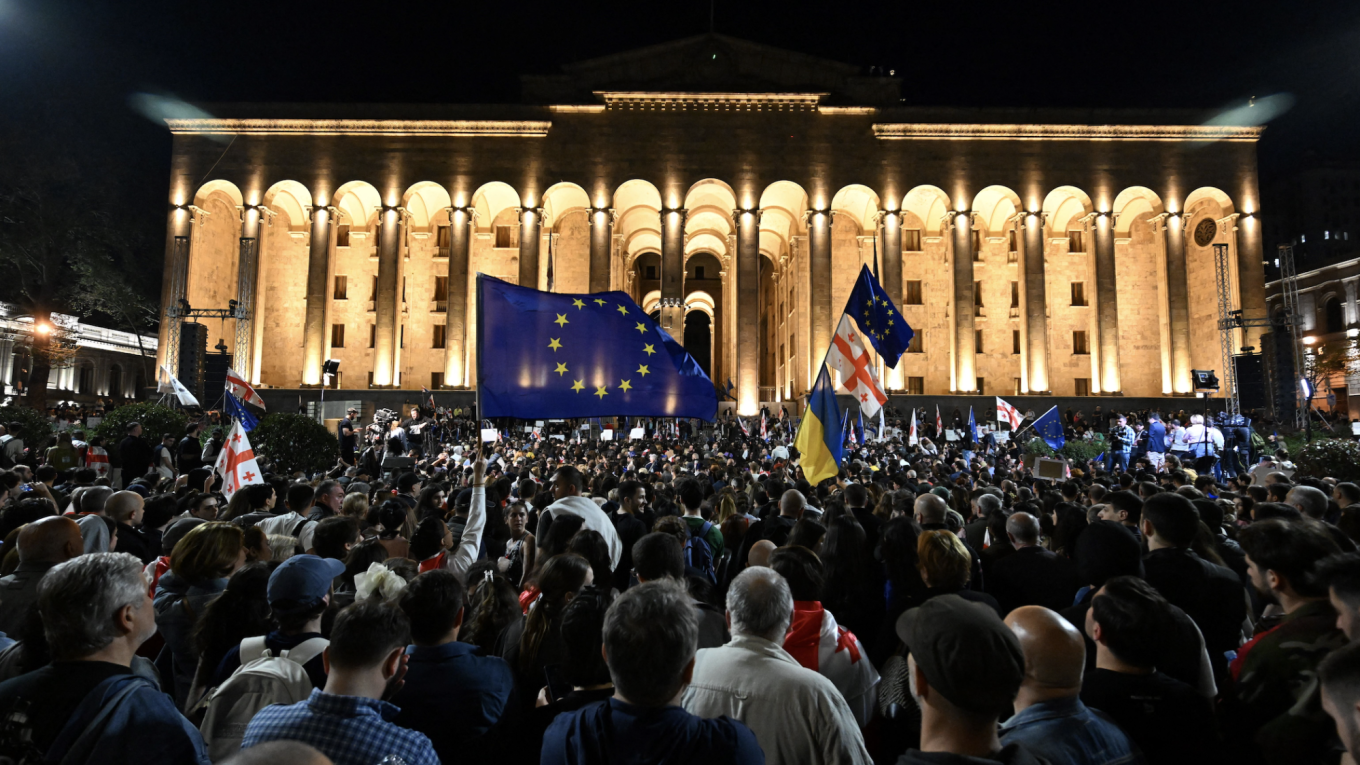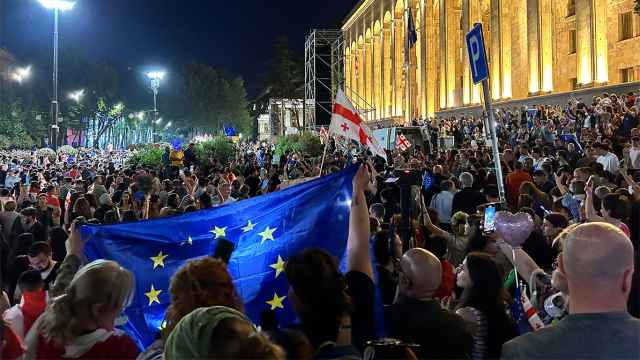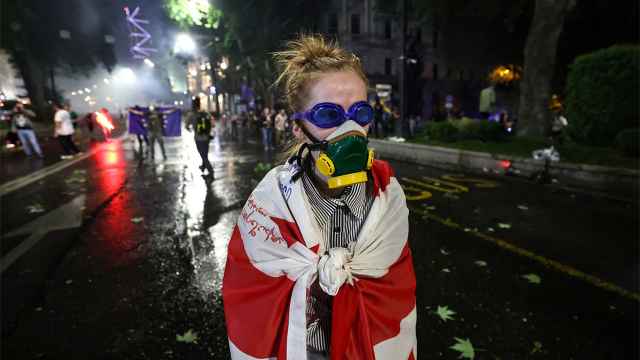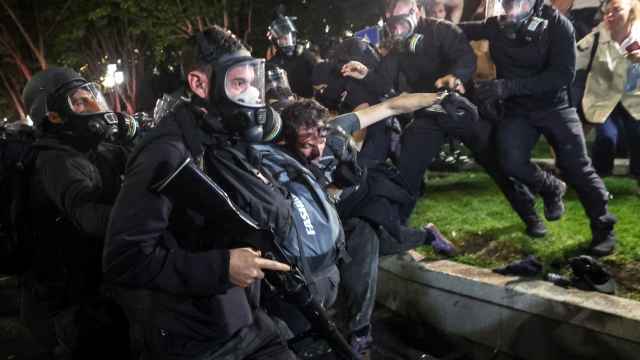Some 20,000 protesters rallied in Georgia on Wednesday after lawmakers advanced a controversial "foreign influence" law that opponents say will undermine Tbilisi's longstanding European aspirations.
In a vote boycotted by opposition deputies, 83 lawmakers from the ruling Georgian Dream party passed the first reading of the bill, which has been criticized as mirroring a repressive Russian law on "foreign agents" used to silence dissent. That was enough for it to pass the 150-seat parliament.
In the evening, thousands of protesters blocked traffic on the main thoroughfare of the Georgian capital Tbilisi, in front of the parliament building, where hundreds of riot police were bused in.
"No to the Russian law!" shouted demonstrators after the Georgian national anthem and European Union's Ode to Joy were performed at the rally, the third day of mass anti-government protests.
"Today is a sad day for Georgia, because our government has taken another step towards Russia and away from Europe," said protester Makvala Naskidashvili.
"But I am also happy because I see such unity among the youth," the 88-year-old added. "They are proud Europeans and will not let anyone spoil their European dream."
Protesters then issued an ultimatum to the authorities, demanding the withdrawal of the draft law within an hour, before marching to the prime minister's offices to demand a meeting with the head of government, an AFP journalist saw.
Protest rallies were also held in several cities across Georgia, including the second-largest city of Batumi, Interpress news agency reported.
Since Monday, thousands have been taking to the streets in Tbilisi every day to protest against the draft law.
Previous days saw riot police chase demonstrators in the labyrinth of narrow streets near parliament, beating them and making arrests.
Several local media outlets said police had attacked their journalists.
'Not in line with EU values'
A former Soviet republic, Georgia has sought for years to deepen relations with the West, but the current ruling party is accused of trying to steer the Black Sea nation toward closer ties with Russia.
Once seen as leading the democratic transformation of ex-Soviet countries, Georgia has in recent years been criticized for perceived democratic backsliding.
Prime Minister Irakli Kobakhidze — known for anti-Western rhetoric while insisting that he is committed to Georgia's Euro-Atlantic aspirations — said the law would boost the financial transparency of NGOs funded by Western institutions.
He then accused some of those civil groups of attempting to drag Georgia into the Ukraine war and to stage a revolution.
"Forward, with dignity, to Europe!" he said after accusing Western leaders of opposing the law without offering arguments against it.
But European Union foreign policy chief Josep Borrell and enlargement commissioner Oliver Varhelyi called Wednesday's vote in the Georgian parliament a "very concerning development."
"Final adoption of this legislation would negatively impact Georgia's progress on its EU path. This law is not in line with EU core norms and values," they said in a joint statement.
In December, the EU granted Georgia official candidate status. But it said Tbilisi would have to reform its judicial and electoral systems, reduce political polarisation, improve press freedom and curtail the power of oligarchs before membership talks could be formally launched.
President Salome Zurabishvili — who is at loggerheads with the ruling party — said the measure contradicted "the will of the population" and denounced it as "a Russian strategy of destabilization."
Washington has also voiced concerns that the law would "derail Georgia from its European path."
'Repressive legislation'
If adopted, the bill would require any independent NGO or media organization receiving more than 20% of funding from abroad to register as an "organization pursuing the interests of a foreign power."
Amnesty International urged Georgia's authorities to "immediately stop their incessant efforts to impose repressive legislation on the country's vibrant civil society."
A similar bill targeting "foreign agents" was dropped last year after mass protests outside the parliament building in Tbilisi, during which police used tear gas and water cannons against demonstrators.
The ruling Georgian Dream party re-introduced the draft law to parliament earlier this month, in a surprise announcement ahead of crucial parliamentary elections in October, seen as a key democratic test for the Black Sea country.
To become law, the bill has to pass second and third readings in parliament and to overcome a likely presidential veto.
But Georgian Dream holds a commanding majority in the legislature, allowing it to pass further stages and vote down a presidential veto without the backing of any opposition MPs.
A Message from The Moscow Times:
Dear readers,
We are facing unprecedented challenges. Russia's Prosecutor General's Office has designated The Moscow Times as an "undesirable" organization, criminalizing our work and putting our staff at risk of prosecution. This follows our earlier unjust labeling as a "foreign agent."
These actions are direct attempts to silence independent journalism in Russia. The authorities claim our work "discredits the decisions of the Russian leadership." We see things differently: we strive to provide accurate, unbiased reporting on Russia.
We, the journalists of The Moscow Times, refuse to be silenced. But to continue our work, we need your help.
Your support, no matter how small, makes a world of difference. If you can, please support us monthly starting from just $2. It's quick to set up, and every contribution makes a significant impact.
By supporting The Moscow Times, you're defending open, independent journalism in the face of repression. Thank you for standing with us.
Remind me later.






